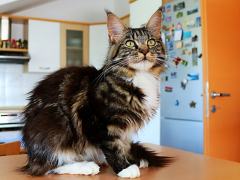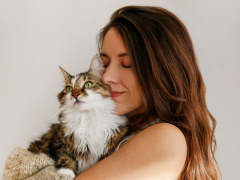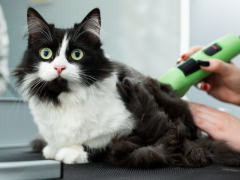
izzet ugutmen / Shutterstock.com
Heart disease is fairly common in older cats and in certain breeds, but there are many different conditions that affect the cardiovascular system by causing an enlarged heart. An enlarged heart cannot pump blood effectively, leading to reduced oxygen delivery and fluid build-up.
Quick Overview: Enlarged Heart in Cats





Let’s go through some of the more common causes of an enlarged heart in cats, what symptoms you might spot in your cat, and how these conditions can be treated or managed.
Causes of an Enlarged Heart in Cats

heart problems can be congenital in cats, but most are acquired and present at middle or older age. Wdnld / Shutterstock.com
Feline cardiomyopathies (a term used to describe diseases of the heart) can occur either as a primary disease, or secondary to other health conditions.
There are different types of heart disease in cats which cause heart enlargement, which have different causes. Here are the top causes of heart enlargement in cats:
1. Dilated Cardiomyopathy (DCM)
In DCM, the heart muscle becomes weak and thin, meaning that it cannot pump blood effectively around the body tissues. Blood builds up in the heart, making the heart chambers bigger and even less able to work well. This mostly affects the left side of the heart, leading to fluid build-up in the lungs.
Dilated cardiomyopathy is thankfully rare in cats now. Historically, this disease was linked to a lack of an essential amino acid, taurine, in the diet. Modern commercial cat foods are now supplemented with taurine, which has dramatically reduced the incidence of DCM in cats. Cats on an inappropriately formulated homemade diet, or those fed a non-complete diet, are still susceptible. In dogs, there have been concerns about grain-free diets being linked with DCM. The FDA is investigating, and so far no conclusive link has been found.
DCM is mostly seen in older cats, and there is a potential genetic link, with certain breeds such as Burmese and Siamese being predisposed to the condition. However, most cases are of unknown cause.
2. Hypertrophic Cardiomyopathy (HCM)
HCM is the most commonly diagnosed heart condition in cats. This condition is opposite to DCM, in that the enlargement of the heart is caused by a thickening of the heart muscles, rather than thinning. The left ventricle is specifically affected, with the amount of blood that can enter this chamber reduced, leading to a loss of blood volume in the heart. The left atrium becomes dilated and blood build-ups up in the heart, which can lead to blood clots and arrhythmias as the heart struggles to maintain oxygen transport and blood flow.
The exact cause of hypertrophic cardiomyopathy in cats is unknown, but there may be a genetic component, with breeds such as the Maine Coon and Ragdoll appearing to be more affected. It can also be secondary to other diseases such as hyperthyroidism (over-activity of the thyroid gland) or hypertension (high blood pressure).
3. Congenital Heart Diseases
Congenital diseases – those present from birth – can cause various problems such as deformity of the heart valves or defects in the wall of the heart between chambers. These can then lead to enlargement of the heart muscle, blood vessels or individual chambers of the heart. Congenital heart defects are relatively rare in kittens.
4. Heartworm
Caused by a parasite called Dirofilaria immitis which is spread by mosquitoes, heartworm is a potentially life-threatening disease. The adult worms live inside the heart, causing a severe amount of damage to the heart muscle and structure. Immature worms live in the pulmonary artery, the main blood vessel between the heart and the lungs and cause respiratory symptoms.
Symptoms of an Enlarged Heart in Cats
Cats with an enlarged heart may show no symptoms at all, as their body can compensate remarkably well in the early stages of disease. However, as heart conditions progress, cats can tip into heart failure, which is when the heart reaches a point where it is no longer effectively pumping blood around the body, and symptoms start to appear. These can be gradual or very sudden in onset.
The exact signs will depend on the type of heart disease, but here are the common symptoms of heart failure in cats:
- Decreased appetite
- Weight loss
- Seeming lethargic, not wanting to play or exercise
- Breathing difficulties – rapid breathing, panting with open mouth, struggling to breath
- Coughing
- Pale gums
- Low body temperature
- Fluid from the mouth or nose
- Swollen tummy due to fluid build-up
- Collapse or sudden death
As a veterinarian, the most common symptom of an enlarged heart that I see in my patients is usually a change in breathing rate or rhythm. Cats are obligate nasal breathers, so a cat breathing with its mouth open is always of concern and should be seen by a veterinarian urgently.
Complications
Cats with an enlarged heart often have changes to the way their blood flows around their heart and in the blood vessels. This turbulent flow can lead to blood clots, which can move around the body in the blood vessels until they cause an obstruction (thromboembolism).
Common places for a clot to lodge include the small vessels in the lungs, causing breathing problems, or at the junction where the aorta (the main artery of the body) branches out to the back legs, causing hind limb pain and even paralysis (a saddle thrombus).
Diagnosis of Enlarged Heart in Cats

An ultrasound scan is often the best way to diagnose an enlarged heart in a cat. David Fuentes Prieto / Shutterstock.com
An enlarged heart in a cat may be first discovered through a routine physical examination with a veterinarian, which is one of the reasons why annual health checks are so important. A heart murmur, caused by unusual blood flow around the heart, can be an early sign that something is amiss. Your veterinarian may also note any irregularity to the heart beat, early signs of fluid in the lungs, and subtle weight loss.
If your cat presents with acute signs of disease, such as difficulty in breathing or collapse, your vet will stabilize them first before diagnosing the exact cause.
Further tests to investigate heart disease may include x-rays, ultrasound (echocardiogram), and electrocardiogram (ECG) and blood tests. In causes of dilated cardiomyopathy, the taurine levels in the blood may be tested to check for a deficiency.
Treatment
The treatment will depend on the exact cause of the enlarged heart in your cat, and whether they are in congestive heart failure, or currently asymptomatic. Cats in acute distress may require immediate and intensive therapy, including diuretics, oxygen supplementation and mild sedatives to reduce stress.
Here are some common long-term medications used for heart disease in cats:
- Diuretics: these are medications which reduce fluid building up in the lungs or abdomen. Furosemide is a common example. They can be given by injection or orally.
- Pimobendan: this medication can help the heart pump more effectively. Studies have shown it can have a large effect on survival.
- ACE-inhibitors: these reduce the workload on the heart, helping it work more efficiently. Examples include benazepril or enalapril.
- Anti-coagulants: blood-thinning drugs, such as clopidogrel, reduce the risk of forming blood clots.
If your cat’s heart problems are caused by heartworm, treatment can be very difficult as the parasite often causes significant damage, and killing them can lead to severe reactions. Prevention is key to the management of heartworm.
Cat Care Tips
Caring for a cat with a long-term disease can be hard. Sadly, heart disease in cats is progressive and incurable, with DCM and heartworm carrying a particularly poor prognosis.
If your cat is diagnosed early in the disease process and responds well to therapy, there are ways to help keep on top of their treatment and symptoms.
- Medications: cats with chronic illness can be on a variety of medications, which can be hard to manage. Read our tips on giving medications to cats, and keep good records of what medication needs to be given at what time.
- Monitor: cats with an enlarged heart should have regular check-ups with a veterinarian. At home, keep a regular track of their resting respiratory rate by counting how many breaths they take in one minute, when they are resting and calm. I recommend this to all owners of feline patients with heart problems, as it can be so helpful to see if their symptoms are progressing.
Frequently Asked Questions
Can cats live with an enlarged heart?
This depends on the cause, but heart disease is often not discovered in cats until the condition is quite far progressed, leading to an often poor outcome. Dilated cardiomyopathy has a particularly poor prognosis, although there are medications which can help manage this condition.
How long can cats live with a heart problem?
Cats with heartworm or dilated cardiomyopathy have a sadly poor prognosis. Cats with hypertrophic or restrictive cardiomyopathy may live for up to a few years with proper treatment, but the disease is sadly progressive.
What are the final stages of congestive heart failure in cats?
Cats with end-stage congestive heart failure will often present with difficulty breathing - this may be breathing very quickly, open-mouthed panting or breathing with a lot of effort. They may also have fluid coming from their nose or mouth, have pale gums and feel cold to the touch. They can also collapse suddenly.
-
Oldach, M. S., Ueda, Y., Ontiveros, E. S., Fousse, S. L., Harris, S. P., & Stern, J. A. (2019). Cardiac effects of a single dose of pimobendan in cats with hypertrophic cardiomyopathy; a randomized, Placebo-Controlled, crossover study. Frontiers in Veterinary Science, 6. https://doi.org/10.3389/fvets.2019.00015
-
O’Neill, D. G., Gunn-Moore, D., Sorrell, S., McAuslan, H., Church, D. B., Pegram, C., & Brodbelt, D. C. (2023). Commonly diagnosed disorders in domestic cats in the UK and their associations with sex and age. Journal of Feline Medicine and Surgery, 25(2). https://doi.org/10.1177/1098612x231155016







